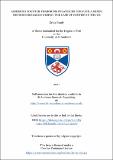Files in this item
Assessing counter-terrorism strategies through a mixed methods research : the case of CONTEST in the UK
Item metadata
| dc.contributor.advisor | Lehr, Peter | |
| dc.contributor.author | Brady, Erika | |
| dc.coverage.spatial | [12], 262 p. | en_US |
| dc.date.accessioned | 2022-06-27T15:20:43Z | |
| dc.date.available | 2022-06-27T15:20:43Z | |
| dc.date.issued | 2021-11-29 | |
| dc.identifier.uri | https://hdl.handle.net/10023/25566 | |
| dc.description.abstract | The study of counter-terrorism has developed considerably since the terrorist events of 9/11 in the US, with a growing interest in understanding which strategies and polices are working and which are not. However, the complexity and challenges of the topic have resulted in research which is dominated by single method, secondary source studies rather than the generation of original empirical research with novel approaches to the methodology. This thesis sets out to address these concerns through the development of a complex research design based on primary sources such as interviews and public opinion polls as well as the documents of government and other relevant agencies and entities which form part of the counter-terrorism landscape. It seeks to better understand the impact of CONTEST, the UK’s counter-terrorism strategy, and it looks at all four workstreams in order to obtain a full and holistic understanding of the performance of the strategy. Further, this thesis presents an analytical model to apply an additional quantitative dimension to the research, further addressing a lacuna in the field. Ultimately, this thesis finds that CONTEST is working appropriately within the reasonable expectations of any government strategy. The analytical model, however, provides additional nuance across the four workstreams and shows that not all of these are performing at the same level across the six themes of Assessment, Learning, Transparency, Perception, Events and Goals. The findings of this thesis are highly significant to the field of counter-terrorism. Not only do they provide deeper understanding of CONTEST than has previously been presented, but the mixed methods and multi-dimensional approach presents interesting insights not previously apparent in single method studies. Further, the model which is developed allows for the ongoing quantitative exploration of CONTEST and other counter-terrorism strategies, particularly those which fall under the Criminal Justice Model. | en_US |
| dc.language.iso | en | en_US |
| dc.publisher | University of St Andrews | |
| dc.rights | Creative Commons Attribution-NonCommercial-NoDerivatives 4.0 International | * |
| dc.rights.uri | http://creativecommons.org/licenses/by-nc-nd/4.0/ | * |
| dc.subject | Counter-terrorism | en_US |
| dc.subject | Terrorism | en_US |
| dc.subject | Mixed methods | en_US |
| dc.subject | Contest | en_US |
| dc.subject | Counter-extremism | en_US |
| dc.subject | Assessment and evaluation | en_US |
| dc.subject.lcc | HV6433.G7B82 | |
| dc.subject.lcsh | Terrorism--Prevention--Case studies | en |
| dc.subject.lcsh | Terrorism--Great Britain--Prevention--21st century | en |
| dc.subject.lcsh | Terrorism--Government policy--Great Britain | en |
| dc.title | Assessing counter-terrorism strategies through a mixed methods research : the case of CONTEST in the UK | en_US |
| dc.type | Thesis | en_US |
| dc.type.qualificationlevel | Doctoral | en_US |
| dc.type.qualificationname | PhD Doctor of Philosophy | en_US |
| dc.publisher.institution | The University of St Andrews | en_US |
| dc.identifier.doi | https://doi.org/10.17630/sta/183 |
The following licence files are associated with this item:
This item appears in the following Collection(s)
Except where otherwise noted within the work, this item's licence for re-use is described as Creative Commons Attribution-NonCommercial-NoDerivatives 4.0 International
Items in the St Andrews Research Repository are protected by copyright, with all rights reserved, unless otherwise indicated.


